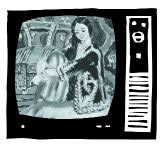WHAT DO WE ink-stained and cybershocked wretches crave almost as much as money? “Impact”—reassurance that our words not only get read but also have some effect. Now Hector Feliciano claims a whopping share of both. In 1997, Feliciano’s book The Lost Museum: The Nazi Conspiracy to Steal the World’s Greatest Works of Art highlighted, among other Nazi-pilfered “lost” masterpieces, Matisse’s Odalisque that was in fact the pride of the Seattle Art Museum’s collection. As Mark D. Fefer reported in these pages, a big stink then rose; SAM thrashed around in the spotlight, sued the dealer it had bought the Odalisque from, and finally surrendered it to the heirs of art dealer and Holocaust victim Paul Rosenberg. Now The Art Newspaper.com reports that Feliciano is suing the heirs for more than $6.8 million—17.5 percent of the $39 million worth of artwork he claims he helped them recover. Feliciano contends that Rosenberg’s daughter-in-law promised he’d be rewarded if his efforts got them any art back. It’s true his book did lead them to the Odalisque, albeit by happenstance—Fefer says another Rosenberg relative chanced to see it on the coffee table at a local party.
Feliciano’s claim raises some interesting questions. Should authors and journalists (the line is thinly drawn) share any profits that others make as a result of their reporting? If so, great; I’ll collect from the wealthy lawyer who saved tens of thousands on his taxes after I reported how he’d mined historic-preservation credits, including a loophole his accountant had in fact missed. (He didn’t mind that expos頡t all.) If they’re entitled to share profits, however, should reporters also reimburse any losses that exposure costs their subjects? We’d pay more often than we’d gain. And the whole idea is brazenly unethical by newspaper standards—though, more and more, books are another matter.
BUY AN AD OR WE’LL SHOOT THIS MAGAZINE
Tough times for Metropolitan Living, the thin but ambitious “Urban Lifestyle Magazine for Puget Sound” that’s attempted a difficult mix of slick printing, free distribution, and serious subjects mixed with the usual service stuff. Despite dire rumors, publisher Paul W. Axtell says Met Living is “still in business,” though seeking “new sources of capital. It’s all up in the air right now. Like any business, we’re experiencing growing pains. But we have a fine product, and we intend to keep publishing it.” In the current issue, editor Alison Peacock sounds a more somber note. After reciting the various ills bedeviling magazines (from media glut to soaring circulation wastage), Peacock asks plaintively, “Is the printed word becoming less important in a millennium that floods all of us with too much information? The advertisers who pay for what you read here and elsewhere seem to think so. Let me know, Seattle, is it true?” Help her.
AND NOW FOR SOMETHING REALLY SCARY
. . . the results of a new Elway Research poll commissioned by the Washington News Council. It’s no surprise that many more adult respondents watch local television news (63 percent) than read a daily paper (46 percent) or listen to radio news (42 percent). But larger shares (though not quite so large as watch it) also think TV news does a good job “covering issues that are most important” to the community, getting facts straight, and upholding “balance and fairness.” How do you square that with the fact that “78 percent said the media increase their credibility when they publicly correct their errors”? Newspapers announce corrections every day, TV almost never. Most frighteningly, 69 percent agreed with the starkly unconstitutional proposition that “the government should require the news media to give equal coverage to all sides of controversial issues.”
UNHERALDED
Amidst all the splash over Katharine Graham’s passing, no one mentioned one small exception to her paper’s and company’s march to greatness: its ventures into smaller newspaper markets. The Washington Post Company’s purchase of the humble Everett Herald seemed to betoken great things, especially when the company sent its hotshot corporate counsel out as publisher to shape up the paper and the town and started inching its circulation Seattleward. But then Graham and Co. took a bath in heavy competition in Trenton, N.J., pulled back to shape up their Newsweek magazine, and let the Herald go back to just being, well, Everett.
THROUGH THE CRACKS
Some days it seems like Seattle’s best newspaper is in Tacoma. Like the day after police nabbed “Cowboy Mike” Braae, the alleged honky-tonk Bluebeard, after a madcap shoot-out-the-tires, jump-in-the-river chase. The Seattle Times and the P-I recounted the chase and the trail of lonely women who loved Braae and disappeared (the Times had more details). But only Tacoma’s News Tribune told a more chilling and significant story: how the Washington Department of Corrections failed to monitor Braae after he was sentenced to community supervision—the latest in a string of costly, often fatal failures.








